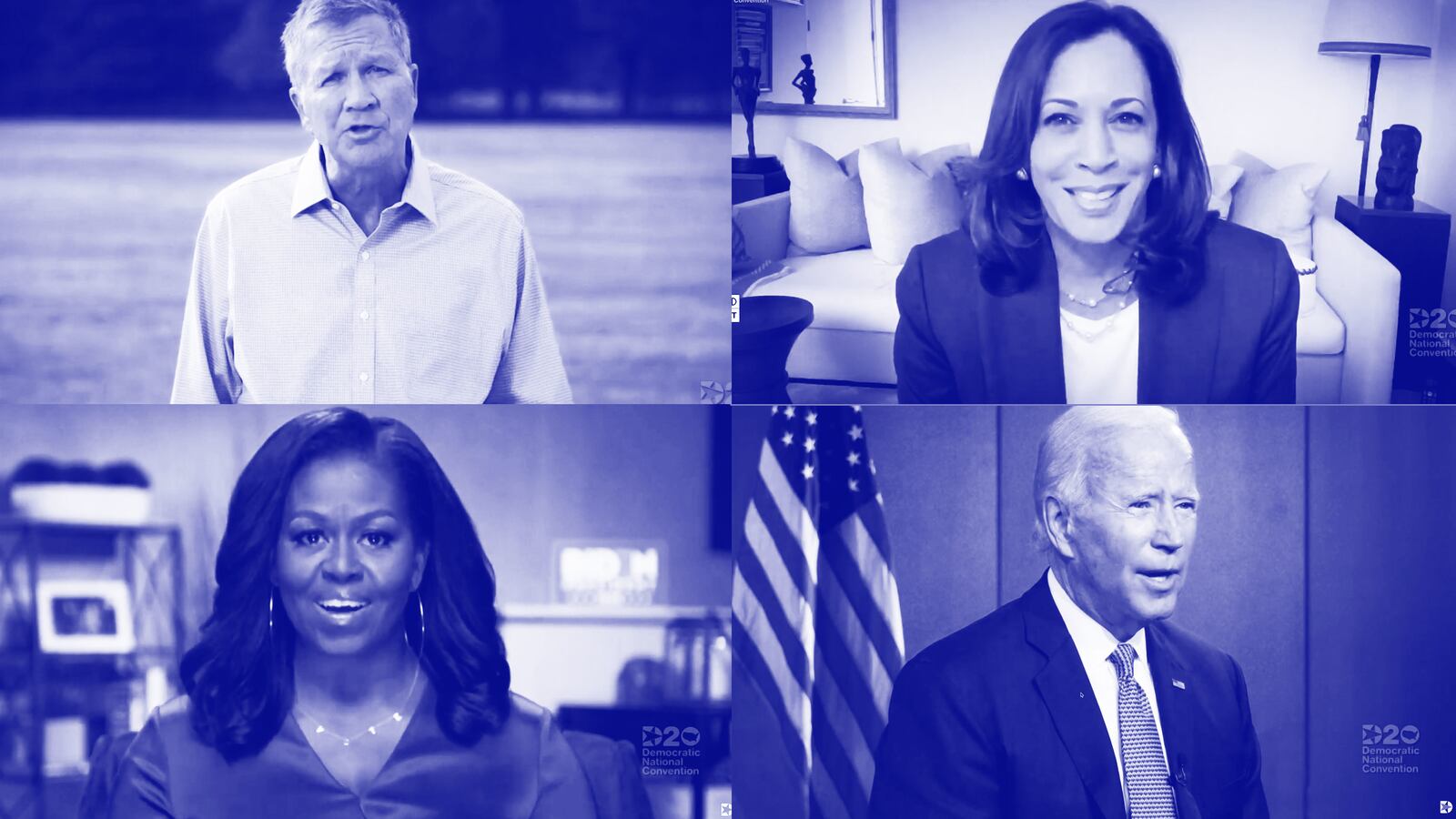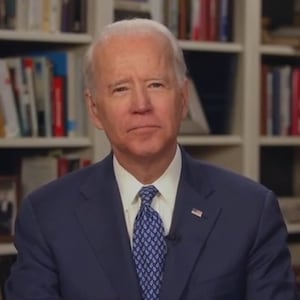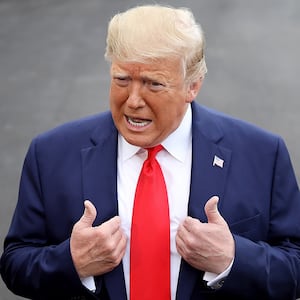In the lead-up to the first night of the Democratic convention on Monday, a top aide working on the event described the goal succinctly: Tearing down Donald Trump was fine, but making an affirmative case for Joe Biden was important.
The result was two hours of programming that may have been born from that objective, but at times seemed to reflect the personality and politics of the former vice president himself.
There were deeply emotional montages and occasional gaffes; anger with the current state of the country and pledges to restore an antiquated sense of decency; promises to tackle progressive agenda items, along with comically overt overtures to disaffected Republicans—with former Ohio Gov. John Kasich standing at a literal crossroads. The programming was disjointed. The tech engagement was minimal. And, naturally, there was an extended homage to Biden’s love of, and extended time riding, Amtrak.
It was at once uplifting and strategically sobering.
“If you think things cannot possibly get worse, trust me, they can,” the keynote speaker, Michelle Obama, declared bluntly.
The Twitter crowd found lots to mock and, then, love. But campaign aides and top party officials said they felt the formula—as it has to this point—largely worked, in part because people would be reminded that the reason they were watching such an unconventional convention was because of a pandemic that Trump’s government couldn’t control.
“The Twitter conversation is a proxy for a bunch of other grievances,” quipped one senior Democrat.
When they set out to build the convention, no one imagined it would resemble this peculiar production. But the COVID-19 pandemic uprooted all the plans and investments that had been put into staging a coronation in Milwaukee and forced Democrats to resort to something that was part-telethon, part-Zoom conference, and part-pretaped testimonials of varying import.
Among Biden aides, there was angst leading up to the evening over just how it would all work. The team faced criticism from progressive Democrats on Monday for handing over so much convention time to Republican lawmakers, though even some OF Sen. Bernie Sanders’ aides thought the concerns were overblown.
“If you are looking through this solely through a political lens, it is absolutely smart of them to have a strategy to bring in conservatives who are disaffected by Donald Trump,” said Faiz Shakir, Sanders’ 2020 campaign manager. “If we had won the nomination you could be damned sure we would be trying to track disaffected conservatives as well. It might not have been John Kasich as a speaker. But the strategy would have been in play.”
But the fears extended beyond whether the party was sending out the right messengers. There was consternation about how those messengers would literally look and sound as well. Early on, there were some breath-holding moments. When Rick Telesz, a farmer from Volant, Pennsylvania, began his riff on how Trump’s tariffs had hurt his family farm, the creak of a farm door could be heard in the backdrop.
A lengthy section about Black Lives Matter with a powerful moment of silence led by Philonise Floyd, George Floyd’s brother, seemed to abruptly segue into a conversation with frontline health-care workers fighting COVID. There were segments on the crisis du jour—the dismantling of the Post Office by Trump for the stated purpose of disrupting mail-in votes. And all of it was peppered by disaffected Trump voters, or relatives of them, explaining why they were switching sides.
In one standout moment Kristin Urquiza mourned her father Mark Anthony Urquiza, a Trump voter who, his daughter said, believed the president when he downplayed the severity of the coronavirus before ultimately contracting the virus at a karaoke bar in late May and dying a few weeks later.
"His only pre-existing condition was trusting Donald Trump and for that he paid with his life," Kristin Urquiza said, pledging to cast a vote for Biden this fall in honor of her father.
The case against Trump having been argued, Biden’s team turned to Sanders and the former first lady to make the case for the former vice president.
Standing in front of a wall of wood in his home state, the Vermonter derided the president as a man "leading us down the path of authoritarianism," amid the painful economic downturn and public health crisis. Preserving the nation’s Democracy is on the line, Sanders said, deriding that under Trump “the unthinkable has become normal.”
"Nero fiddled while Rome burned," Sanders said. "Trump golfs."
But the lambasting of Trump was soon complemented by the night’s other main objective: the case for Biden, despite the policy differences between the two rivals that left them at times far apart on policy ideals during the heated 2020 primary. Biden will help move the country forward, Sanders said, emphasizing his support for raising the minimum wage, making it easier to join unions, and boosting paid family leave among other Democratic policy ideals.
"Joe Biden will end the hate and division Trump has created," Sanders said.
And then came Obama. In the lengthy speech that closed out the night, Obama touched on the fears of the American public. Times are tough, people are struggling, and tuning into a political convention—or even the election for that matter—can prove to be a difficult task. Biden, she argued in the affirmative, was a man cut for this moment, even as she conceded that he was not “perfect,” since no president ever is.
“I know Joe,” she said. “He is a profoundly decent man, guided by faith… He will govern as someone who’s lived a life that the rest of us can recognize.”
But even the former first lady—who had famously touted the need to “go high” when the opposition goes low—rested her case on the need to rid the country of Trump.
“[G]oing high means unlocking the shackles of lies and mistrust with the only thing that can truly set us free: the cold hard truth,” she said. “So let me be as honest and clear as I possibly can. Donald Trump is the wrong president for our country. He has had more than enough time to prove that he can do the job, but he is clearly in over his head. He cannot meet this moment. He simply cannot be who we need him to be for us. It is what it is.”








